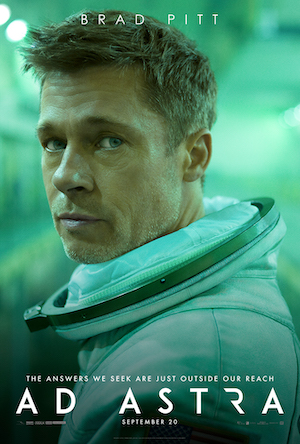

Ad Astra (James Gray, 2019) wr. James Gray and Ethan Gross; Brad Pitt, Ruth Negga, Tommy Lee Jones; release 20 September
Astronaut Roy McBride undertakes a mission across an unforgiving solar system to uncover the truth about his missing father and his doomed expedition that now, 30 years later, threatens the universe.
I found this sufficiently enthralling. We all seem to be taking SFx for granted these days (as I suppose they're mostly CGI anyway) but I don't think a certain amount of wonder at the technical achievements here is out of place.
But I have limited time, so I'll get straight to the main story. James Gray, as writer, draws attention to The Heart of Darkness as a predecessor. This is done through the convention of the internal monologue, which Jessica Kiang (bottom) thinks is pointless. While some of it is, much of it is of timeless value, like Marlow's—on which, by the way, it actually throws new light (for me, anyway).
It's Oedipus revisioned. It even shows the son killing the father, in a scene which I found staggerly underdone, under-prepared, underplayed, and underwhelming.
To finish on a positive note: Brad Pitt's performance is impressive. To compare it to the one in Once Upon a Time in Hollywood is to perceive what a fine actor he is. Tommy Lee Jones' scenes are few and brief and wisely use just his face in different odd lightings and angles to convey his madness.
...
A Wikipedia editor has kindly put together this range of responses, that suggest, by the way, that there are many unrelated aspects to the film which are not well enough integrated:
Richard Roeper of the Chicago Sun-Times gave the film 3.5 out of 4 stars and said "In the hands of director and co-writer James Gray, Ad Astra is one of the most beautiful films of the year, even when it makes little sense and even when Brad Pitt’s performance veers between one of his all-time best and one of his all-time not-best." David Ehrlich of IndieWire gave the film an "A", saying that "Ad Astra is one of the most ruminative, withdrawn, and curiously optimistic space epics this side of Solaris. It's also one of the best." Similarly, Xan Brooks of The Guardian gave the film five out of five stars, called it a "superb space-opera" and praised Pitt's performance, writing: "Pitt embodies McBride with a series of deft gestures and a minimum of fuss. His performance is so understated it hardly looks like acting at all." Variety's Owen Gleiberman praised Pitt's performance and wrote: "Gray proves beyond measure that he's got the chops to make a movie like this. He also has a vision, of sorts — one that's expressed, nearly inadvertently, in the metaphor of that space antenna." Peter Travers of Rolling Stone rated the film four out of five stars and referred to it as "absolutely enthralling" and praised Gray for his direction and his unique approach to the science fiction genre, as well as the cinematography and Pitt's performance (whom he referred to as "marvel of nuanced feeling"). He also drew comparisons of the film's tone and themes to other notable films set in space, particularly 2001: A Space Odyssey (1968), Solaris (1972), Gravity (2013) and Interstellar (2014).
Adam Graham writing for The Detroit News found problems with the film giving it a "C" rating and stating that, "This is slow, obtuse filmmaking with little emotional connection." Critic Laura Dean Mandel in Film-Forword found similar difficulties with the film stating that "While Ad Astra richly imagines practical and interpersonal aspects of settlement on the moon and beyond, the insights on human nature are on the simplistic level of pop psychology."
Jessica Kiang, in Sight&Sound: "Ad Astra works hard to convince us it is narratively worthwhile to imperil all life in the universe in order for one guy to work through his daddy issues, but doesn’t let us join even the closest of dots for ourselves, making it a sometimes thrilling and always beautiful 2.7 billion-mile odyssey, in which somehow, there’s just not enough space."
Garry Gillard | reviews | New: 6 February, 2020 | Now: 14 February, 2020